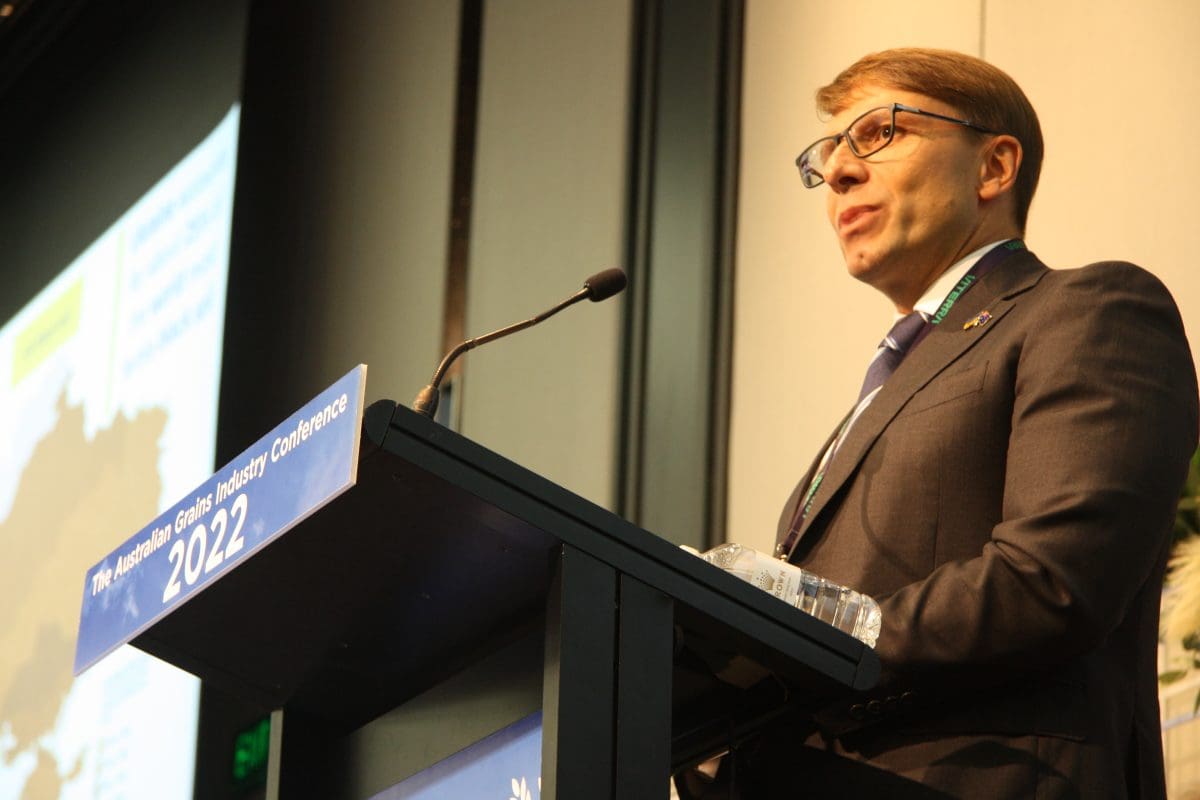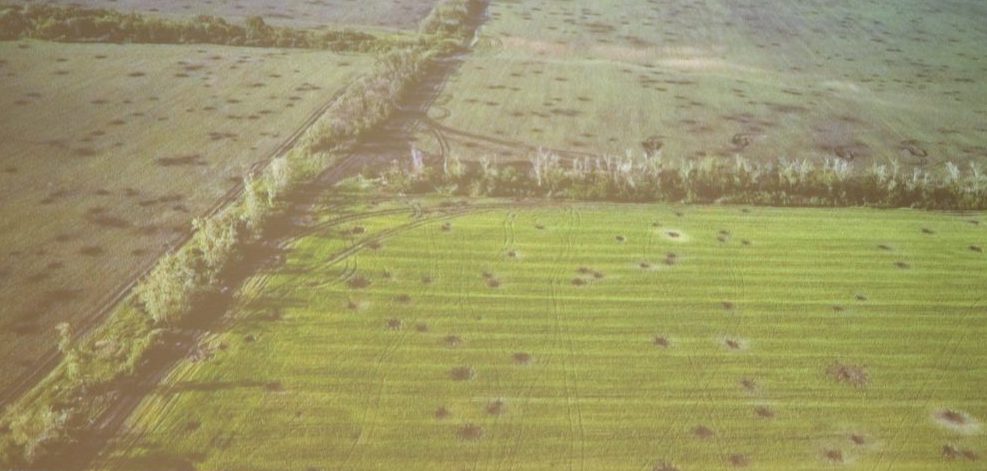
Ukraine Grain Association president Mykola Gorbachov.
THE movement of grain out of Ukraine has been reduced to an evacuation rather than an export program as Russia’s invasion continues to throttle shipments out of Ukraine’s Black Sea ports, according to Ukraine Grain Association president Mykola Gorbachov.
As a guest speaker at the Australian Grains Industry Conference (AGIC) 2022, Mr Gorbachov spoke on the topic of Black Sea: Grain Market Implications and Global Food Security, and his address drew two standing ovations from the packed auditorium with close to 500 people in attendance.
Mr Gorbachov spoke of the pain Ukraine is experiencing as a result of Russia’s aggression, and the impact of its inability to export to Asia, North Africa and the Middle East, which previously accounted for around 65-75 per cent of its export customer base.
While Europe was previously the market for the balance, it is by necessity now the destination for all grain and oilseeds leaving the country, but land and river-based transport is no match for Ukraine’s Black Sea ports now blockaded by Russian forces.
“For the moment, the price is so high it’s not business, it’s grain evacuation,” Mr Gorbachov said.
“Mostly it’s the international company who has stocks in Ukraine and they evacuate this grain.”
Mr Gorbachov said the cost of getting grain out of Ukraine through road and rail networks, or on barges, made it impossible for Ukrainian growers to turn a profit in the current environment.
He said while Ukraine’s cost of production of one tonne of wheat was around US $200/t and the nominal market price was $290/t, the cost of transport without the Black Sea was crippling at $100-$400/t, depending on proximity to the European border.
Mr Gorbachov said in the current climate, grain production in Ukraine was “absolutely unprofitable”.
He said Ukraine’s system of growers renting land made the current squeeze a threat to production in the near term.
“That’s why I’m afraid that if our farmers will sell the grain at losses, they just will become disappointed and what will happen in the next 3-5 years is they will decrease production.”
Ukraine exports around 80pc of its grain, and Mr Gorbachov said the export choke was expected to force its ending stocks to increase from 6.5Mt to 43Mt.
“If we are not able to export this volume, we’ll decrease our production.”
Mr Gorbachov said barge freight to Constanta on the Danube, which forms part of the border between Bulgaria??? And Ukraine before the war was about $15/t.
“Now this price is up to $100/t.”
Mr Gorbachov said congestion on roads, rail, canals and rivers has become a problem, with “four barges in and four barges out and 100 barges in a queue” evident on one waterway, and truck queues of up to 17km.

Fields in Ukraine’s Kharkiv region show damage from Russian attacks, and harbours unexploded ordnance as a threat to Ukraine’s farmers and citizens. Photo: UGA
Impact on Africa
Mr Gorbachov said the high prices of oilseeds meant they had a better chance of returning a profit for growers than corn and cereals.
“I think farmers will sell first of all rapeseed and sunflower seed.
“All these logistics chain will be busy with oilseeds and there will be no space for wheat and corn.”
He said developed countries are better able to weather food inflation already evident, but populations in poorer economies, including some African nations which are normally volume buyers of Ukrainian grain, are at risk of famine or being displaced by food shortages.
“If they come to Europe…their situation will have absolutely different consequences.”
“That’s why I’m sure the international community will find a way now to open Ukrainian ports.
“In this year so many people, mostly in Africa, they just will lose opportunity to purchase cheaper grain.”

GTA CEO Pat O’Shannassy gave the vote of thanks to AGIC 2022 presenter UGA president Mykola Gorbachov, who received two standing ovations from the audience in a show of solidarity from the Australian grain industry. Photo: AGIC Australia 2022
New-crop pathway limited
While Ukraine was exporting 6 million tonnes (Mt) of grain per month, 95pc of it by sea, prior to the Russian invasion, Mr Gorbachov said exports have now fallen to around 2Mt since late February, with around 1Mt being shipped by river barges into Europe, and rail and road sharing the rest.
Prior to the Russian invasion, Ukraine expected to export 110Mt of grain in 2021-22, a figure which has been revised down to 70Mt, and new-crop volume is hitting the bins now.
“Now our expectation is for 30Mt of exports this season.”
Between July last year and the Russian invasion in February, Ukraine exported 46.4Mt of grain, but shipped just 4.3Mt in March-June, far greater drop than its usually seasonal drop-off.
Mr Gorbachov said sufficient stocks were at port to allow exports to resume immediately if a safe passage through the Black Sea was assured.
“We still have about 3-3.5Mt of grain ready to load.
“We just have to press the button.”
As direct negotiations involving Turkey and the United Nations, and their negotiations with Russia, continue, Mr Gorbachov holds some hope that Ukraine’s Black Sea exports will resume.
“We will see in the next one to two weeks how it works.”
Get Grain Central’s free news straight to your inbox – Click here
